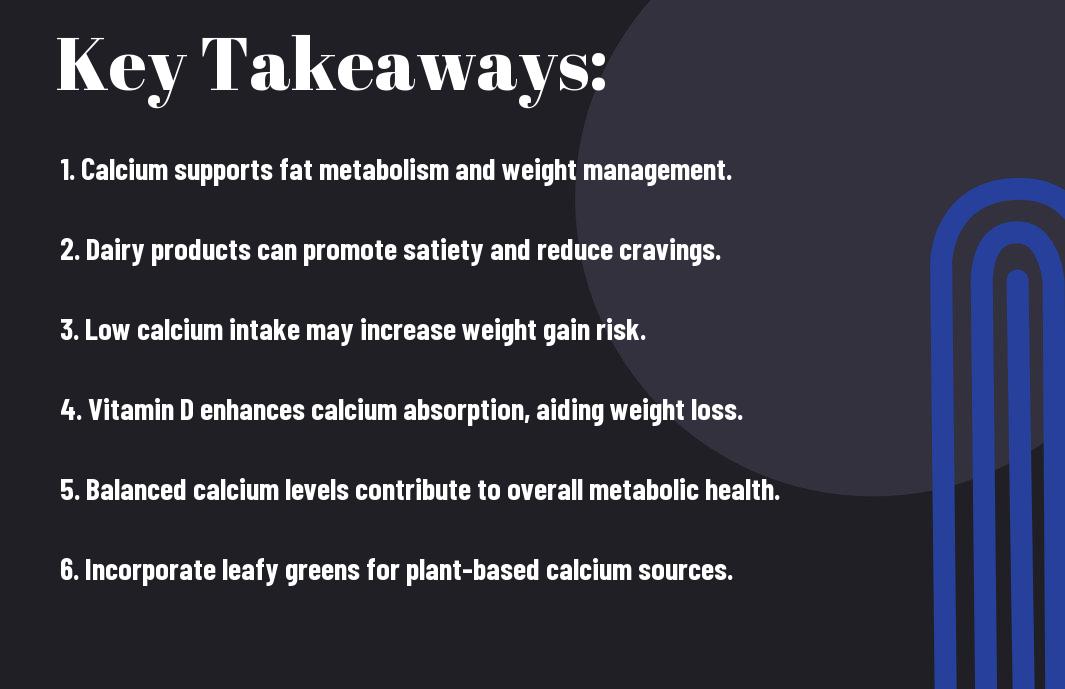With calcium playing a significant role in your weight loss journey, understanding its impact can help optimize your efforts. This necessary mineral not only supports bone health but also influences fat metabolism and satiety. By learning how to incorporate calcium-rich foods into your diet, you can potentially enhance your weight loss results while boosting overall well-being. In this post, we will explore the connection between calcium and weight management, providing you with the insights needed to harness its benefits effectively.
Key Takeaways:
- Calcium’s Role: Adequate calcium levels support weight loss by regulating fat metabolism.
- Fat Storage: Calcium may influence how our bodies store fat, potentially reducing fat accumulation.
- Impact on Hunger: Calcium can help in controlling appetite and reducing cravings, leading to better dietary choices.
- Bone Health: A healthy calcium intake is crucial for strong bones, which can support physical activity levels during weight loss.
- Sources of Calcium: Incorporating dairy, leafy greens, and fortified foods can enhance calcium intake in the diet.
- Vitamin D Interaction: Vitamin D works with calcium, and both are important for overall weight management efforts.
- Overall Balance: Combining calcium with other nutrients and a balanced diet can optimize weight loss results.
The Role of Calcium in Metabolism
For optimal metabolism, calcium plays a pivotal role that often goes unnoticed. It helps in the regulation of various enzymes that facilitate the metabolism of carbohydrates and fats. By ensuring that your body effectively breaks down these macronutrients, adequate calcium levels can contribute to a more efficient metabolism, aiding your weight loss journey. Integrating calcium-rich foods can support this process, helping you achieve your weight management goals more effectively.
How Calcium Affects Energy Expenditure
Behind weight loss, energy expenditure is a key player, and calcium contributes to this process significantly. Research indicates that adequate calcium intake can enhance the dynamics of energy expenditure, helping your body burn calories more effectively. Through various physiological mechanisms, calcium may influence the ways your body utilizes energy, thus supporting your weight loss goals.
Calcium’s Impact on Fat Storage
The relationship between calcium and fat storage is multifaceted and vital to your weight loss journey. Research suggests that sufficient calcium levels may assist in reducing fat storage within the body. When your calcium intake is adequate, it may play a role in regulating the hormones that control fat cells, leading to lower fat accumulation. Thus, ensuring you consume enough calcium can support your efforts in maintaining a healthy body composition.
It is important to understand that the impact of calcium on fat storage extends beyond mere numbers on a scale. Adequate calcium intake helps manage the hormones associated with fat retention, thereby enabling your body to utilize fat more efficiently. Furthermore, a balanced diet rich in calcium may reduce the likelihood of unhealthy weight gain, making it a vital aspect of your overall nutritional strategy for effective weight management.

Dietary Sources of Calcium
Even though calcium is often associated with dairy products, it can be found in a variety of foods. Incorporating a balanced diet rich in calcium can support your weight loss journey. You can enjoy leafy greens, nuts, seeds, legumes, and fortified plant-based milk. These options not only provide calcium but also contribute to your overall nutritional needs while helping you remain mindful of your calorie intake.
Natural Food Sources
By focusing on natural food sources, you can easily meet your calcium needs without relying on supplements. Green vegetables like broccoli and kale, along with almonds and chia seeds, are excellent choices. Additionally, canned fish with bones, such as sardines and salmon, offer a tasty way to boost your intake while providing other vital nutrients that support your weight loss efforts.
Supplementation Options
One common approach to increase your calcium intake involves supplementation. For those who find it difficult to get enough calcium from food sources, a supplement can be an effective solution. Various forms are available, such as calcium carbonate and calcium citrate, both of which can help you reach your desired levels.
Further, it’s crucial to choose a calcium supplement that works best for your needs. If you experience digestive discomfort with calcium carbonate, consider switching to calcium citrate, which is often gentler on the stomach. Always consult with your healthcare provider before starting any supplementation to ensure it aligns with your individual health goals, especially during your weight loss journey.

Calcium and Hormonal Balance
Unlike other nutrients, calcium plays a vital role in maintaining hormonal balance in your body. It can influence the secretion of hormones that are imperative for metabolism and fat loss. Studies have shown a connection between calcium levels and hormonal balance, particularly in relation to hormones such as insulin and leptin. For a detailed examination of this relationship, check out the Effect of Calcium Supplementation on Weight and Fat Loss.
Calcium’s Influence on Insulin Sensitivity
About insulin sensitivity, research indicates that adequate calcium intake may enhance your body’s ability to utilize insulin effectively. Improved insulin sensitivity allows you to maintain stable blood sugar levels, reducing fat storage and possibly aiding weight loss efforts.
The Role of Calcium in Appetite Regulation
To regulate your appetite effectively, a sufficient intake of calcium is imperative. When your calcium levels are adequate, it can assist in managing hormones that control hunger and satiety, making it easier for you to resist cravings and maintain a healthy eating pattern.
Further, research suggests that calcium may influence the production of leptin, a hormone that signals fullness. Proper levels of calcium can help ensure that leptin functions optimally, leading to better appetite control and weight management. This makes calcium an important factor in your overall weight loss journey, as it can help you feel satisfied, thereby preventing overeating.

Research Studies on Calcium and Weight Loss
Despite numerous studies exploring the link between calcium intake and weight loss, results remain mixed. Some research suggests that higher calcium levels may support fat metabolism and encourage weight loss, while other studies find negligible impacts. The inconsistency in findings often stems from variations in study design, population demographics, and dietary approaches, making it important for you to examine individual circumstances when considering calcium’s role in your weight loss journey.
Meta-analyses and Key Findings
On reviewing various meta-analyses, some have indicated a positive association between calcium supplementation and weight loss, particularly in individuals who are calcium-deficient. These findings suggest that increasing dietary calcium, particularly from dairy sources, may aid in body fat reduction, though the extent of the effect varies among individuals. You may benefit from consulting a healthcare professional to tailor calcium intake to your unique weight loss strategy.
Limitations of Current Research
After evaluating the existing literature, it becomes evident that current research has limitations, such as small sample sizes and short study durations. Furthermore, many studies rely on self-reported dietary intake, which can introduce bias and inaccuracies in data collection. These factors can hinder your understanding of the true impact of calcium on weight loss.
Hence, you should approach these findings with caution. Limitations like inconsistent methodologies and varying definitions of weight loss can lead to conflicting results. Additionally, not all populations respond similarly to calcium supplementation, making it difficult to generalize the data. As you navigate your weight loss journey, consider these factors when evaluating the role of calcium and seek guidance from health professionals to ensure a well-rounded approach.
Incorporating Calcium into a Weight Loss Plan
Many individuals overlook the role of calcium in their weight loss journey. By integrating calcium-rich foods or supplements, you can enhance your metabolism and minimize fat storage. Explore resources like Is Calcium the New Magic Bullet? to learn how to optimize your calcium intake effectively and support your weight loss goals.
Recommended Daily Intake
Between adults, the recommended daily intake of calcium typically ranges from 1,000 to 1,200 mg, depending on age and gender. It’s vital to meet your daily requirements to help support both your weight loss efforts and overall health.
Tips for Increasing Calcium Intake
Into your routine, you can easily boost your calcium levels by incorporating various food sources. Consider the following tips:
- Include dairy products like yogurt, cheese, and milk in your meals.
- Incorporate leafy greens such as kale and broccoli into your diet.
- Explore fortified foods like almond milk or orange juice.
Thou can also engage in meal planning to ensure that you consistently consume these calcium sources throughout the week.
Incorporating calcium-rich foods into your weight loss plan doesn’t have to be challenging. Start thinking of diverse options that will keep your meals exciting:
- Snack on cheese or yogurt for a nutritious treat.
- Add chia seeds or almonds to your smoothies for an extra boost.
- Experiment with recipes that feature tofu or white beans.
Thou can find creative ways to enhance your intake, making your weight loss journey not just effective but enjoyable.

Potential Risks of Calcium Deficiency
To understand the significance of maintaining adequate calcium levels, it is imperative to recognize that a deficiency can lead to various health complications. Low calcium can result in weakened bones, increased risk of fractures, muscle pain, and even interfere with normal bodily functions. As you commence on your weight loss journey, neglecting your calcium intake may not only hinder your progress but also jeopardize your overall wellbeing.
Effects on Weight Loss
Against common belief, low calcium levels can actually impede your weight loss efforts. Studies indicate that insufficient calcium can lead to weight gain and difficulty in shedding extra pounds. This is because calcium plays a role in fat metabolism; thus, suboptimal levels may increase the chance of storing fat. Ensuring you consume enough calcium could support your weight loss journey by optimizing your body’s ability to utilize fat effectively.
Long-term Health Implications
Longterm calcium deficiency can have serious health repercussions beyond weight management. Insufficient calcium intake may lead to osteoporosis, a condition characterized by weak and brittle bones, which heightens the risk of fractures and disabilities as you age. Furthermore, chronic low calcium levels can contribute to cardiovascular issues, as calcium is vital for normal heart function and muscle contraction. Prioritizing calcium not only aids in your present weight goals but also protects your future health.
The implications of long-term calcium deficiency extend far beyond immediate weight loss challenges. It can significantly weaken your skeletal structure, making you more susceptible to fractures, particularly in older age. Additionally, low calcium can disrupt hormonal balance, potentially contributing to issues like high blood pressure and heart disease. By achieving adequate calcium intake, you fortify your bone health and bolster your overall well-being, ensuring that you remain fit and active throughout your life.
Conclusion
As a reminder, incorporating adequate calcium into your diet can positively influence your weight loss journey. It helps regulate fat metabolism and may assist in maintaining muscle mass while you’re burning calories. By paying attention to your calcium intake through foods like dairy, leafy greens, and fortified options, you empower yourself to enhance your weight management efforts. So, consider the role of calcium as you navigate your path to healthier living and body composition.
FAQ
Q: How does calcium impact weight loss?
A: Calcium may influence weight loss in various ways, including aiding in the regulation of hormones that control fat storage and metabolism. Some studies have suggested that higher calcium intake may encourage fat breakdown and reduce fat absorption in the body, potentially assisting in weight management.
Q: Can taking calcium supplements help with weight loss?
A: While some research indicates that calcium supplements might help with weight loss, the results are mixed. It’s generally advised to prioritize dietary calcium sources, like dairy products, leafy greens, and fortified foods, as these contain other nutrients that support overall health and weight loss strategies.
Q: What are the best dietary sources of calcium for weight loss?
A: Some of the best dietary sources of calcium include low-fat or non-fat dairy products, such as yogurt and cheese, leafy greens like kale and broccoli, fortified plant-based milks, and certain fish, such as sardines. Incorporating these options into a balanced diet may support weight loss efforts.
Q: Is there a recommended daily intake of calcium for weight loss?
A: The recommended daily intake of calcium varies by age and gender, but generally falls between 1,000 to 1,300 mg for adults. Meeting your calcium needs can contribute to overall health and may aid in weight loss, but it’s important to balance it with other nutrients and calories in your diet.
Q: Can low calcium intake hinder weight loss?
A: There is some evidence to suggest that low calcium intake may be associated with difficulty in losing weight. Insufficient calcium may lead to hormonal changes that cause increased fat storage. Ensuring adequate calcium in your diet may support your weight loss goals.
Q: Should I consider calcium-rich foods over weight loss supplements?
A: Prioritizing calcium-rich foods over weight loss supplements is generally recommended. Whole foods provide not only calcium but also crucial vitamins, minerals, and fiber that support overall nutrition and health, enhancing your weight loss journey holistically.
Q: Are there any risks associated with high calcium intake during weight loss?
A: Excessive calcium intake can lead to adverse effects, such as kidney stones and constipation. It’s important to balance your calcium intake and consult with a healthcare professional to determine the appropriate amounts for your individual needs, particularly if you are pursuing weight loss.





